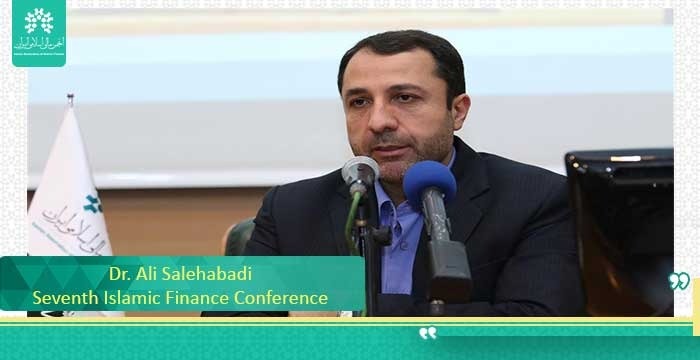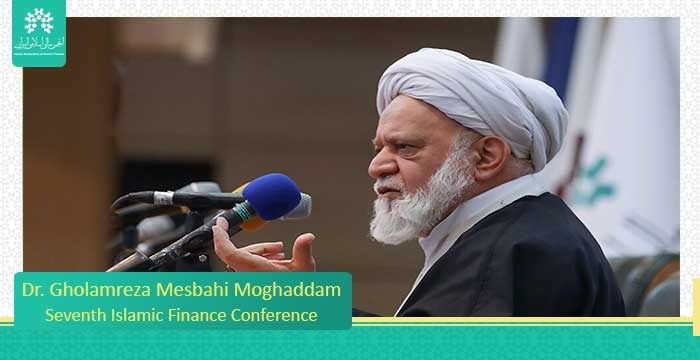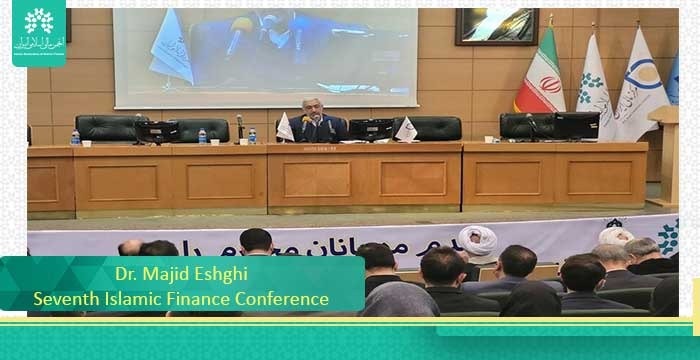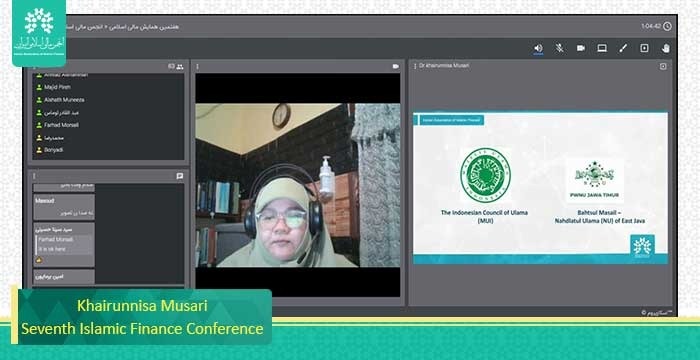




The IAIF held the 7th Islamic Finance Conference on Cryptocurrencies: Global Experience, Islamic Approach, Opportunities and Challenges.
The Iranian Association of Islamic Finance held the 7th Islamic Finance Conference on Cryptocurrencies:Global Experience, Islamic Approxh, Opportunities and Challenges, on 17 Jan.
First Lecturer
Majid Eshghi, President of the Securities and Exchange Organization, in this conference, examined the cryptocurrencies from the two perspectives of "currency" and "assets" saying, if we consider cryptocurrencies as a type of currency, its policy-making, usage and development are done by the central bank according to the law, so the exchange organization does not enter this field.
He added cryptocurrency market developments are accelerating. In the European Union and other bodies commenting on financial instruments, the issue of cryptocurrency as an asset is being debated. In terms of recognizing this phenomenon as an asset, it is also in the realm of capital market watchdogs. Therefore, from this angle the capital market can also enter the field of cryptocurrencies and use it.
The President of the Securities and Exchange Organization went on to say that now we have to determine the field of cryptocurrency in several dimensions such as mining, transactions, platforms, issuing cryptocurrencies in the domestic market and an official institution should make a decision regarding blockchain technology.
He mentioned that the entire population of the country is now directly and indirectly active in the capital market, adding that the use of consensus algorithms such as the blockchain algorithm or other algorithms which are being developed in capital market processes should be considered.
Using the blockchain in the capital market
Another serious issue, as mentioned, goes back to the applications of consensus algorithms in the discussion of transaction registration. One of the ways in which financial markets are moving is to simplify trading.
Regarding settlement, Eshghi stated despite the large number of market practitioners and the need for simultaneous settlement of transactions, it can be said that one of the technologies that can help is the use of blockchain technology and consensus.
‘This is also true in the discussion of the application of asset transfer. In the next few years, we will probably have to turn both physical assets and securities into Tokens that we can transfer in a context with multiple players, keep in mind that as the capital market expands, it needs new instruments to provide better services and management, but this is not just a matter for financial institutions’ the President of the Securities and Exchange Organization said.
Finally, he mentioned we ask the Sharia committee, both in the Exchange Organization and in the Central Bank, to help us to convert current assets (physical assets and securities) into Tokens and use them based on jurisprudential considerations. Tokens contribute us to facilitate transactions and settlement.
Second Lecturer
Regarding cryptocurrency, Gholamreza Mesbahi Moghadam, Chairman of the Sharia Council of the Central Bank, said in terms of nature, cryptocurrency is considered as a phenomenon of new technologies. Its founder is not known. It has no legal basis. Although some governments have accepted it, the cryptocurrency has not been recognized by most governments.
‘One of the challenges these cryptocurrencies face is the sharp fluctuation of their prices’, furthermore, there are 180 central banks in the world, but there are 15,000 cryptocurrencies’ he said.
He went on to say that these cryptocurrencies face a combination of transparency and various ambiguities. On the one hand, their transparency is related to informing everyone about the quantity of these cryptocurrencies and the number of stakeholders, but it is ambiguous in various ways, the most important of which is the ambiguity in terms of Maliat; are the cryptocurrencies property (Mal) or not?
It is true that if cryptocurrencies become a common currency, they become profitable as intermediaries of exchanges, but until such a benefit is clarified, it cannot be said that cryptocurrencies are property.
Mesbahi Moghaddam explained if a central bank in the world, including the Central Bank of the Islamic Republic of Iran, issues a cryptocurrency or is backed by regional agreements of several countries, or a law is passed to give credit to cryptocurrencies, then they become valuable and become property. But as long as there is no national law or international rule behind these cryptocurrencies, their ownership is questionable.
The import of goods and services by cryptocurrencies mined by Iranians or traded in world markets can be a source of import and is not prohibited by in terms of sharia.
Third Lecturer
Dr. Ali Salehabadi, Governor of the Central Bank, referring to the approval of the Instruction of Cryptorial, said last week, the Cryptorial instruction was approved by the Monetary and Credit Council and its related framework was determined. It will be operated and launched soon. I must emphasize that this issue is very important and we welcome different perspectives in different dimensions, especially in the field of policy-making.
Regarding the recent amendments have been made to the instructions of the sharia council of the Central Bank, he said by applying these amendments, an attempt has been made to see the issue of Islamic banking more comprehensively.
He added we must witness both the implementation of Islamic banking and the resolutions of the sharia council, in practice.
The Governor of the Central Bank stressed that the issue of Islamic banking is one of the concerns of the government, religious people, scholars and we have to all move towards the compatibility of our banking with Islamic banking with the help of all authorities.
International Panel
First Panelist’s Presentation (From England)

Dr. Abdulkader Thomas, Chairman of IFN Advisory Board at REDmoney and Director of SHAPE Knowledge Services, Islamic Financial Services Company, began his presentation with comparing common currencies with digital currencies at the International Panel Section of the 7th Islamic Finance Conference entitled Cryptocurrencies; Global experience, Islamic approach, opportunities and challenges.
Regarding the characteristics of common currencies, he said they are valuable, widely accepted and have no religious restrictions; while cryptocurrencies are known as a class of assets, they must follow the rules of currency trading; furthermore, there is the lack of real exchange based on the full value of the cryptocurrencies.
Thomas divided digital currencies into two parts; digital currencies that are issued by central banks and are recognized as common currencies due to their compliance with foreign exchange laws, and from the point of view of sharia scholars there is no disagreement about this, and digital currencies that are issued in person that can be divided into permissible and impermissible categories.
Permissible cryptocurrencies in this group are recognized as a common currency due to their compliance with foreign exchange laws; moreover, they are supported with silver, gold or currency. Although they are considered as a valuable asset, they are not in compliance with foreign exchange laws.
‘On the other hand, some cryptocurrencies are issued privately, considered impermissible for a number of reasons, some of which are violations of the law, misuse of them. For example, this type of cryptocurrency is used to finance terrorism and drug trafficking. However as circumstances change, so can the rules.
Dr. Abdulqader Thomas ended his presentation with raising 6 questions.
1. If crypto is not state governed, issued, who is benefiting from seignorage?
2. If crypto is not state governed, issued, how is criminal behavior controlled?
3. Can crypto improve delivery of social benefits?
4. What is the environmental impact of crypto?
5. Does crypto’s use of key resources harm the rest of society?
Is crypto an answer to monetary policy? Think of El Salvador.6?
Second Panelist’s Presentation (From Indonesia)

Dr. Khairunnisa Musari, Assistant Professor, Kiai Haji Achmad Siddiq State Islamic University (UIN KHAS); Deputy Coordinator of Central Indonesia, Central Board (DPP) of the Indonesian Association of Islamic Economist (IAEI), talked about three aspects of cryptocurrency in Indonesia; regulator and Ulema Council, industry and investors.
She said a daily transaction value of cryptocurrency in Indonesia in 2021 reached IDR2.3T, showing 1,178% growth comparing with the previous year which was IDR180B.
Musari stated that Commodity Futures Trading Regulatory Agency (CoFTRA/BAPPEBTI), under Ministry of Trade is the authority to regulate and supervise crypto in Indonesia.
Also, Bank Indonesia affirms that virtual currencies, including bitcoin, are not recognized as legitimate instrument of payment, therefore they are not allowed to be used for payment in Indonesia. This is in line with Act No.7/2011 on The Currency, which states that currency shall be money of which issued by the Republic of Indonesia and every transaction that has the purpose of payment, or other obligations which need to be fulfilled with money or other financial transactions conducted within the territory of the Republic of Indonesia, has to be fulfilled with Rupiah.
Assistant professor of Kiai Haji Achmad Siddiq State Islamic University mentioned that Potential Risks of cryptocurrencies are:
First, payment system risk and IDR management risk;
Second, capital outflow risk that can affect monetary policy;
Third, the risk of financial system stability in terms of crypto asset transactions is getting bigger and more complex and involves financial institutions;
Fourth, the risk of violating the principles of Anti-Money Laundering and Prevention of the Financing of Terrorism;
Fifth, the risk of violating consumer protection and personal data protection.
She stressed that the Investment Alert Task Force (SWI) asks the public to be wary of crypto-asset investment offers that are currently rife so as not to fall victim to the offers of crypto asset traders who are not registered with the Commodity Futures Trading Supervisory Agency (CoFTRA/BAPPEBTI) of the Ministry of Trade, thereby potentially harming the public.
The Futures and Commodity Trading Regulatory Agency (CoFTRA/BAPPEBTI) has taken firm steps against potential physical crypto-asset traders who are found to have violated established rules. Most recently, CoFTRA/BAPPEBTI has canceled its registration as a prospective Physical Crypto Asset trader for PT Bursa Cripto Prima and suspended the activities of PT Plutonext Digital Asset.
Regarding the Ulema Council’s Fatwa, Musari said it published the following fatwas:
The use of cryptocurrency as a legal currency is haraam, because it contains gharar, dharar and is contrary to Act 7/2011 and Bank Indonesia Regulation 17/2015.
Cryptocurrency as a digital commodity/asset is not legally traded because it contains gharar, dharar, qimar and does not meet the shar'i sil'ah requirements, namely: there is a physical form, has value, the amount is known with certainty, property rights and can be submitted to buyer.
Cryptocurrency as a commodity/asset that qualifies as sil'ah and has an underlying and has clear benefits that it is legally valid to be traded.
As to industry achievement, Musari mentioned that international collaboration such as ASEAN Blockchain Consortium, Blockchain Association Forum, Global Digital Finance and International Digital Asset Exchange Association are some of them.
At the end, the member of the Indonesian Association of Islamic Economist said Crypto assets are very unstable and very volatile. There is a tendency to contain elements of uncertainty (gharar) and gambling (maysir). There is no real sector where the funds work, the way it works is still so vague, it doesn't share the risk when it loses, so crypto assets are only a mere speculation tool.
Crypto contains the element of betting, the element of intention to seek income/income by lottery, the element of taking the rights of others who lost in the transaction (zero-sum game), and the profit at stake is the result of joint collection not from other parties (sponsorship).
Third Panelist’s Presentation (From Malaysia)

Dr Aishath Muneeza, Associate Professor at INCEIF talked about a conventional and shariah analysis of Bitcoin, saying the contention surrounding acceptability and usage of Bitcoin has an unsettled premise in both law and Shariah even though digital and cryptocurrencies reflect a reality that has come to stay.
She stated the idea of cryptocurrency exists long before its reality today which is championed by Bitcoin (BC); furthermore, Cryptocurrency and Bitcoin are new concepts that come to light with the contemporary emergence of digital currency about a decade ago. BC is the first digital currency used as money without any institutional backing behind it.
The blockchain verifies and ensures authenticity of every BC transaction as a mechanism against double spending which is possible only when a majority of CPU power, at least 51%, is controlled by dishonest nodes. Creation of BC is the outcome of mining, a very challenging task which involves solving some complex mathematical puzzles.
Muneeza mentioned money is defined by its value propositions not by the form or structure it takes, while Bitcoin (BC) provides:
-Anonymity in transactions
-decentralized form where only the earlier transactions are honored, and any later attempt becomes essentially worthless
-Trust is not required
Given the kind of uncertainties surrounding BC as depicted by its ‘wild ride’ in the figure, it is not surprising that many people cannot accept CC as medium of exchange, regardless of general market growth valued at more than USD260 billion as at end January 2020. According to a study, people are reluctant to use BC as a medium of exchange due to its volatility and even BC’s proponents see it rather as an investment tool than currency.
In terms of sharia, the professor at INCIEF said Bitcoin and the concept of Cryptocurrency are relatively new and opinion regarding their status in Islam is a debatable issue. The values of cryptocurrencies are yet to be fully perceived. The literature of BC and CC in Islamic economy is at its initial stage, and so no conclusive comment can be made to determine their fate in the Islamic economy. What is understood is that there is room for innovation in choosing a currency of their own in Islam as understood from the time of Muslim Caliph Umar bin Khattab where he said: “I would like to make money out of camel leather.” Then it was said to him that there will be no more camels and Umar bin Khattab abandoned the plan.
As to the definition of Mal and Money in the light of sharia, Muneeza stated:
Money should be scarce to obtain.
Wide acceptance of the money as a medium of exchange.
Money can be divided into the small parts to facilitate small transactions.
Transactions using a specific form of money should possible with a lower fee.
Value of money should remain reasonably stable over the period of time.
Her conclusion was as follows:
It is true that not everything about BC and CC is bad.
The technology of blockchain is amazing and revolutionary.
BoE’s governor identities BC as the gateway to the future form of digital currency. BC is believed to be the inspiration for the next big revolution that will overcome the limitations of virtual currencies.
In fact, BC is identified to be better than fiat currency for at least two reasons. First is that the supply of Bitcoin is known to everyone.
The second is that double spending is hardly possible without 51% hijacking of CPU powers or attack from dishonest nodes, which is almost impossible. Nonetheless, this research holds that it is very unlikely that BC will denominate the currency world. In the recent times, it is observed that the price of BC is responsive to regulatory actions.
Moreover, as the central banks want full control over the monetary systems, the more popular the BC becomes then the stricter regulatory actions it will face in the coming days. Bitcoin will not survive in its long-run fight with regulators.
In the future, it is expected to see BC-inspired currency that does not humiliate government controls over the currency. BC market is a highly speculative at this moment and for all intent and purpose, government engagement is necessary for the development of BC as an asset class to address its volatile store of value and poor unit of account problems.


